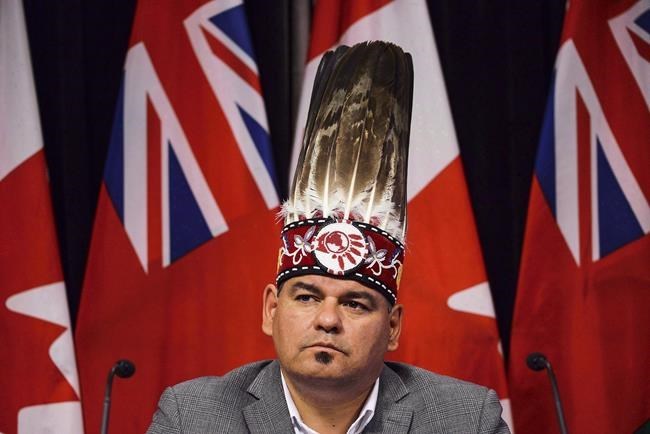
Ontario Regional Chief Isadore Day attends a news conference at the Ontario Legislature in Toronto on September 9. 2015.THE CANADIAN PRESS/Aaron Vincent Elkaim
May 30, 2016 - 1:05 PM
TORONTO - Premier Kathleen Wynne has apologized on behalf of the Ontario government to First Nations, Metis and Inuit communities for the abuses residential school survivors faced. The formal apology in the legislature on Monday was part of the province's reaction to the 2015 Truth and Reconciliation Commission, which found that children were physically and sexually abused and died in numbers that would not have been tolerated in any school system.
Here are a selection of quotes from aboriginal leaders and residential school survivors reacting to the announcement and apology:
___
Andrew Wesley, survivor:
"As survivors we've been to the top of the mountain. On top of the mountain we were given new fire to talk about our hurts, our pain, our struggle...We were instructed to be strong. We were instructed not to be ashamed. We were instructed not to be afraid to talk about dehumanization. We were not afraid to talk about the traumatization of our spirits. We came down from that mountain and we're telling you the truth of what happened. We're telling you the truth because we're tired of being hurt. We want to travel with the rest of you in a good way. From that mountain we gained the strength we needed. Many of us went to the various TRC hearings to be able to tell our story, not to be afraid to cry, the way we cried when we were abused like little kids, not to be afraid to cry as an adult, as a grandfather. To me, reconciliation didn't mean anything for a long time. Why should I reconcile? I didn't do anything wrong. Why? I was taken away. I was beaten up, but I didn't do anything wrong. Why should I reconcile to the government? To the church? But because of my wife, her strength, encouragement, I started to understand what reconciliation is all about. And as I get old, I started to understand more that I have to talk about the abuse and be able to release the pain I was carrying. Now I understand what reconciliation is all about. I understand. You know, when a hunter is about to go out and get food for his family, the night before he goes out, he speaks to the game that he's going to bring home, to ask for forgiveness. From that mountain we were given the power to honour the people that abused us because we want to live a good life."
___
Ontario Regional Chief Isadore Day:
"As we stand in the presence of our residential school survivors we are reminded of a system meant to kill the Indian in the child. Not only have they suffered unspeakable abuse, their children and grandchildren have also suffered. How terribly sad that this horrible legacy continues to impact our present generations, as so evident in the current suicide crisis of our children and youth. The vast majority of us as First Nations people across this land can speak of the direct impacts of this dark legacy. Yes, many of us have lived in the direct darkness and shadows of the evil that was so evident in so many of those schools."
___
Dawn Lavell-Harvard, president of the Ontario Native Women's Association:
"Reconciliation means more than just the restoration of our relationship. Our women, our people, have unaddressed grief, intergenerational trauma, as the residential schools severed the most important bond, that bond between indigenous children and their mothers and their families. This system exposed our children to a cycle of violence that continues today, but we know that violence is a learned behaviour and therefore we also know that we can unlearn this behaviour. We can make a change."
___
Helen Cromarty, survivor:
"As a residential school survivor, there were things taken away from us that we can never ever get back, doesn't matter how hard you work at it. I worked hard to get my culture back, my language. I still have to work at it. There are many missing things that I can never ever get back, but having the government apologize and acknowledge the damage that has been done, I feel a little reprieve. I can live with it and I think that's another step forward. Why not keep going? The path is there now, follow it. ...I left home when I was five years old, so the family bonding that all of you get when you're a child, in those formative years, I don't have that. But I somehow learned that, after having five children I worked hard at bonding."
___
News from © The Canadian Press, 2016